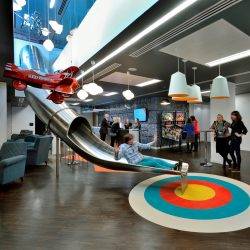February 5, 2019
A morning adrenaline rush improves workplace productivity
 A new academic study has found the benefits of taking part in adrenaline boosting activities before work. Researchers from the University of Essex School of Sport, Rehabilitation and Exercise Science, tested workers from the International Quarter London (IQL), the gateway to Queen Elizabeth Olympic Park and discovered that taking a 40 second ride down the world’s tallest and longest tunnel slide at the ArcelorMittal Orbit improved levels of happiness, productivity, creativity, energy and focus in workers. The impacts of exercise on wellbeing have been well-documented; however, this is the first time that research has shown that similar affects can be achieved from a quick adrenaline boosting activity.
A new academic study has found the benefits of taking part in adrenaline boosting activities before work. Researchers from the University of Essex School of Sport, Rehabilitation and Exercise Science, tested workers from the International Quarter London (IQL), the gateway to Queen Elizabeth Olympic Park and discovered that taking a 40 second ride down the world’s tallest and longest tunnel slide at the ArcelorMittal Orbit improved levels of happiness, productivity, creativity, energy and focus in workers. The impacts of exercise on wellbeing have been well-documented; however, this is the first time that research has shown that similar affects can be achieved from a quick adrenaline boosting activity.















 Fifty percent of UK employees feel their employers don’t understand them or their potential – higher than the European average of 46 percent according to a study of over 2,000 workers across the UK, France, Germany, Italy and the Netherlands from ADP. The research found that 40 percent of UK workers are unhappy with the quality of leadership, with only France reporting slightly higher figures, where 52 percent saying they feel misunderstood by their employer. This was followed closely by Italy (48 percent) and Germany (46 percent), while the Netherlands reported the most positive results with only a third stating such feelings (35 percent). However, UK and European employees are more likely to feel their direct reports understand them better, with 61 percent reporting that their managers know and support them, and want to see them succeed. This shows that those working more closely together enjoy better relationships, which in turn is likely to lead to better quality of work and greater productivity. The lesson for businesses is that close relations between all staff, regardless of seniority, matter.
Fifty percent of UK employees feel their employers don’t understand them or their potential – higher than the European average of 46 percent according to a study of over 2,000 workers across the UK, France, Germany, Italy and the Netherlands from ADP. The research found that 40 percent of UK workers are unhappy with the quality of leadership, with only France reporting slightly higher figures, where 52 percent saying they feel misunderstood by their employer. This was followed closely by Italy (48 percent) and Germany (46 percent), while the Netherlands reported the most positive results with only a third stating such feelings (35 percent). However, UK and European employees are more likely to feel their direct reports understand them better, with 61 percent reporting that their managers know and support them, and want to see them succeed. This shows that those working more closely together enjoy better relationships, which in turn is likely to lead to better quality of work and greater productivity. The lesson for businesses is that close relations between all staff, regardless of seniority, matter.














February 7, 2019
Maybe the time has come to shoot the workplace messenger
by Rob Harris • Comment, Flexible working, Wellbeing, Workplace design